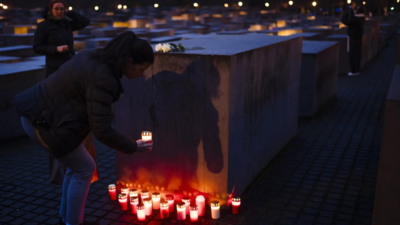Outside the German Bundestag, flags are flying at half-mast, and inside, wreaths have been placed at the speaker’s lectern. Many members of parliament are dressed in black, as are many guests. Speeches are given, and there is devout applause.
Every year since 1996, this is how the victims of the Nazis have been memorialized at the Bundestag on January 27 – a date internationally known as Holocaust Remembrance Day. It marks the anniversary of the 1945 liberation of the Auschwitz concentration and extermination camps. This act of commemoration is central to Germany‘s “culture of remembrance”.
There are more than 300 memorial sites and Nazi documentation centers in the country. Schoolchildren learn about National Socialism in history lessons. Some of them also visit former concentration camps, where memorials teach them about the atrocities committed by the Nazis.
As a nation, Germany experienced large-scale war crimes trials, such as the Auschwitz trials. German companies have traced their own historical involvement in Nazi crimes. Even to this day, elderly wardens of Nazi killing centers are still on trial.
Holocaust Remembrance Day is a reminder of the darkest chapter in German history. Nazi Germany sparked World War II, with its many millions of deaths, and was responsible for the systematic murder of six million European Jews, as well as hundreds of thousands of other victims of Nazi terror: Sinti and Roma were targeted, as were political opponents, homosexuals and people with disabilities.
What is German ‘remembrance culture’?
Political scientist and journalist Saba-Nur Cheema describes it thus: “Remembrance culture is a collective knowledge about – and remembrance of – the past. In Germany’s case, the memory of the Holocaust is central, as well as an examination of National Socialism.” Other themes have become increasingly important in recent years, such as East Germany’s postwar dictatorship, and Germany’s role as a colonial power.
Young people might think that Germany always cultivated a culture of remembrance.
However, the attorney general who brought the criminal acts in Auschwitz to trial in Frankfurt in the face of great resistance, Fritz Bauer, is reputed to have said in the 1960s: “Enemy territory begins when I leave my office.” Bauer was Jewish. He only survived the Nazi era by fleeing to Sweden.
Holocaust Remembrance Day for the victims of National Socialism was only instituted in Germany in 1996. It has never been designated a public holiday.
Remembrance and commemoration: threatened by the right
The commemoration of Nazi crimes has often been targeted with hostility – especially by the extreme right, and right-wing populists in Germany. Jens Christian Wagner, Director of the Buchenwald and Mittelbau-Dora Memorial, a former Nazi concentration camp near Weimar, has taken a clear stance against the Alternative for Germany (AfD) party in Thuringia. He has said in the past that the party has far-right elements – and has written on X that he received threats.
“Almost all memorial sites face vandalism and Holocaust denial. But you also see the debate intensifying locally,” says Veronika Hager from the Remembrance, Responsibility and Future (EVZ) Foundation, part of whose mission is to keep the memory of National Socialist persecution alive. “Statements we would have rejected ten years ago as relatively extreme in society as a whole, are now much more popular.”
AfD leader Alice Weidel recently made the following statement during a TV interview: “There is no doubt that Adolf Hitler was an antisemitic socialist – and antisemitism is primarily left-wing.” That aligns with earlier statements made by AfD colleagues, such as former head Alexander Gauland, who famously played down the Nazi era as simply “bird poop in history.”
“The goal is to soften up the situation, so that we end up not even talking about what happened. The danger is that the threat posed by right-wing nationalist groups could then become intangible and no longer concrete,” says Cheema.
Is the culture of remembrance failing?
Michel Friedman is one of many journalists who, for years, have been drawing attention to growing antisemitism and racism. He is highly critical of the current “culture of remembrance”. In an interview with the German news magazine Der Spiegel he said: “If we had done our homework, this shameless and brutal hatred of Jews would not be rampant.”
For him, as well as for Jewish organizations and associations in Germany, the “culture of remembrance” is too ritualized, too anchored in the past: “As important as it is to deal with the dead Jews: Our responsibility must lie with the living Jews. And life in Germany is not good for them.”
Culture of remembrance does not (automatically) combat antisemitism
In recent years, the number of incidents and attacks attributed as antisemitic have risen in Germany. For some, this proves that this nation’s “culture of remembrance” has failed. The country’s culture of remembrance and the protection of Jewish life are often considered intrinsically linked: Lessons from the past are meant to produce responsibility today. However, Joseph Wilson, an expert on “Acting against antisemitism” at the EVZ Foundation says that such an assumption expects the culture of remembrance to produce something it cannot.
“A culture of remembrance is not the same thing as preventing and combating antisemitism,” says Wilson. The compassion one might feel while visiting a memorial site does not automatically translate into the present day, and it does not lead to people recognizing antisemitic codes and conspiracy theories in society.
“Instead, we have to realize that our antisemitism prevention concepts have failed in parts,” he said.
One – or many cultures of remembrance?
Many aspects of Germany’s culture of remembrance have been discussed and debated. Historians have disputed the singularity of Nazi crimes, for example, and there have been discussions in newspapers. The massacre by Hamas on October 7, 2023, and the ensuing war on Gaza, with its tens of thousands of deaths, represent another schism – these events exposed a fracture in German society.
For example, the phrase “Never again is now” can have radically differently meanings in Germany today. The slogan was generally used to express the sentiment that the Nazi crimes must never happen again. Many people interpret it as an expression of solidarity with Jews and Israel. However, the same slogan has also been shouted in solidarity with Palestinians at pro-Palestinian demonstrations.))
Ever since Angela Merkel’s famous speech at the Israeli parliament in 2008, when she declared Israel’s security to be “a reason of state for Germany”, support for Israel has often been understood to be part of Germany’s responsibility – part of its culture of remembrance. For some here, that means its culture of remembrance is non-inclusive, is not designed for today’s mixed immigrant society.
Saba-Nur Cheema disagrees: “I wouldn’t say that it wasn’t designed for that. Because civil society itself shapes a culture of remembrance.” Germany’s full support for Israel at the start of the Gaza war, however, which it justified with its own history, was sharply criticized, “including by many young immigrants.” Cheema says they posed questions like: “Why are Palestinians suffering in this way now?” Indeed, “it’s not a bad question to ask,” she added.
Cheema believes the slogan, “Free Palestine from German Guilt!”, often chanted at protests, is primarily a political message and not an attack on the culture of remembrance. The Research and Information Center on Antisemitism (RIAS), on the other hand, assesses the slogan in a report as a “desire to draw a line under the Nazi past.”
Discussions like these are perhaps a sign that there are many “cultures of remembrance” in Germany – not just one.
Remembrance remains important
Veronika Hager from the EVZ Foundation suggests one way to move forward: “There are so many things we can specifically examine in our daily environment. For instance, company trainees could review their own firm’s activities during the Nazi era, or one could find out which residents in specific houses were murdered. Such activities could be undertaken with young people, whether they have an international background, or not.”
What is generally little discussed in Germany are the biographies of perpetrators in one’s own family. Journalist Michel Friedman, who is Jewish, once said, “You know, there are millions of contemporary witnesses! Look what your grandparents, great-aunts and great-uncles did!”
That could perhaps be the next step in the development of Germany’s culture of remembrance. “I don’t ever want to get to the point where we say: ‘So, now we have the perfect culture of remembrance,’ and put a checkmark beside it,” says Veronika Hager. “For me, it’s always something discursive that moves and develops.”




